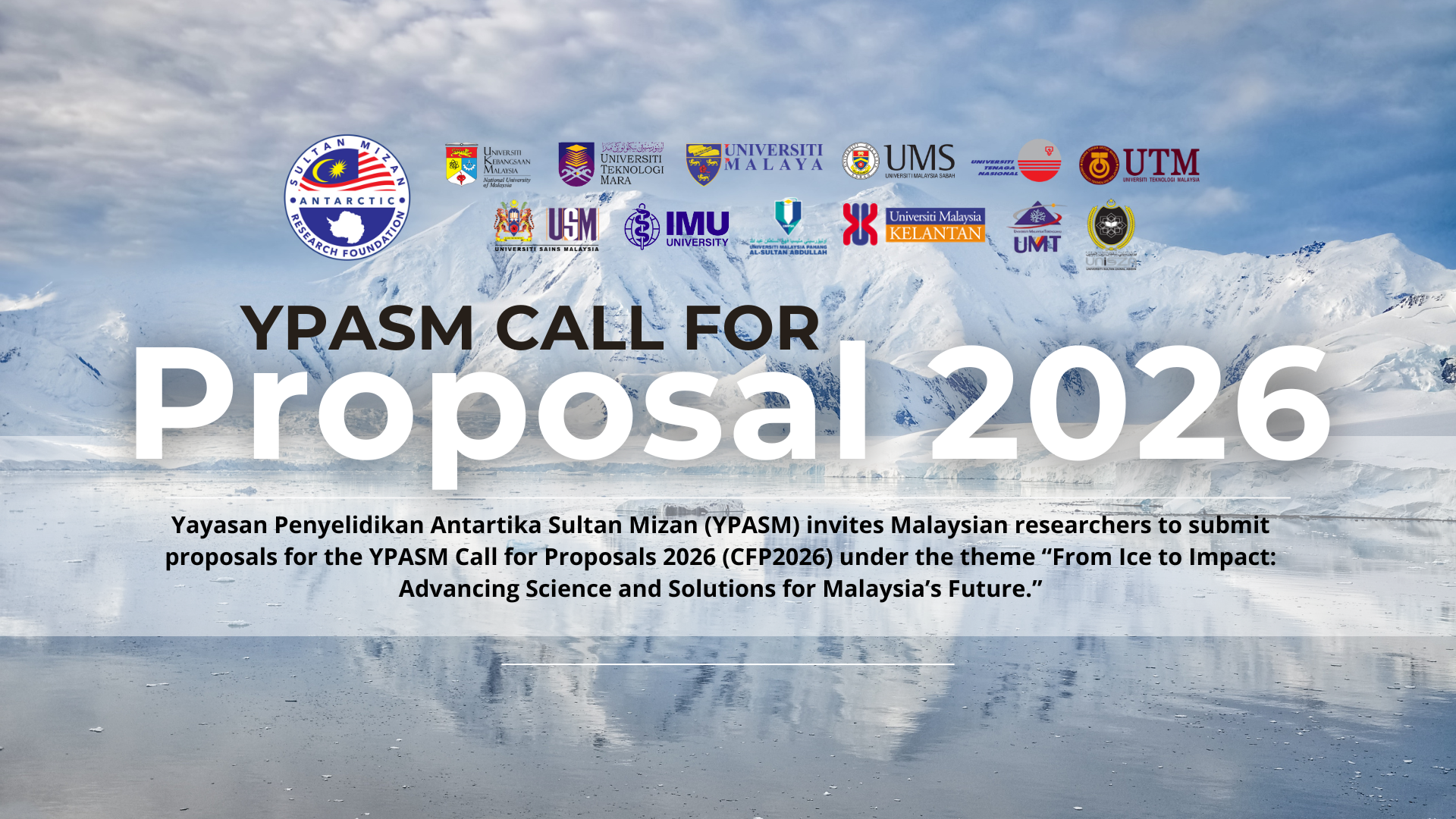From Ice to Impact: Advancing Science and Solutions for Malaysia’s Future
Yayasan Penyelidikan Antartika Sultan Mizan (YPASM) invites Malaysian researchers to submit proposals for the YPASM Call for Proposals 2026 (CFP2026) under the theme “From Ice to Impact: Advancing Science and Solutions for Malaysia’s Future.”
Through strategic funding, partnerships, and international collaboration, YPASM continues to strengthen Malaysia’s role in polar research and its connection to global sustainability challenges. Malaysia’s active participation in platforms such as the Asian Forum for Polar Sciences (AFoPS), Scientific Committee on Antarctic Research (SCAR), and the upcoming International Polar Year 5 (IPY5) underscores its growing leadership and commitment to the Antarctic cause.
As we aspire to discover new frontiers of knowledge, connect through interdisciplinary and international collaboration, and transform science into tangible benefits for society, the YPASM Call for Proposals 2026 (CFP2026) seeks to:
- Encourage Malaysian researchers to pursue impact-driven polar science with applications for Malaysia and the region, especially in addressing climate change and ice-melting impacts on communities and livelihoods.
- Strengthen collaboration under existing Memorandum of Understanding (MoU), SCAR initiatives and AFoPS frameworks.
- Support research that contributes to Malaysia’s readiness for Antarctic governance engagement and participation in the Antarctic Treaty System.
- Complement ongoing discussions towards IPY5 participation and international collaboration.
- Promote cross-disciplinary projects that connect the polar and tropical systems, particularly in climate science, engineering, and societal resilience.
Research Focus Areas
Life Sciences and Biotechnology
- Biodiversity, adaptation, and ecological resilience of Antarctic organisms.
- Biotechnology applications for health, pharmaceuticals, and industry.
- Microbial and ecosystem responses to extreme conditions and temperature variations.
- Food web and biogeochemical interactions under changing sea-ice dynamics.
- Linking biological processes to climate and ecosystem services relevant to Malaysia’s environmental and food security challenges.
Physical and Climate Sciences
- Cryosphere and atmospheric studies: ice-sheet dynamics, and polar–atmosphere interactions and their teleconnections to tropical climate variability.
- Paleoclimate and ice-core research: unlocking Antarctica’s climate history to inform future climate projections and resilience planning.
- Sea-level rise and polar–tropical linkages: modelling Antarctic melt impacts on Southeast Asia’s coasts, fisheries and livelihoods.
- Polar Technology & Engineering: Design and testing of materials, sensors, energy systems, and infrastructure (e.g., pipes, rubbers, polymers, insulation materials) for extreme environments including potential industry collaboration.
- Renewable energy and sustainable field technologies: energy-efficient systems for polar operations and adaptation to extreme environments.
- Data, Modelling & AI: Advanced simulations, data-driven predictions, and technology-enabled observations of the Antarctic environment and its impact pathways to Malaysia.
Policy & Social Science Research
- Governance and legal frameworks: pathways for Malaysia’s progression toward Consultative Party status under the Antarctic Treaty; assessing benefits, obligations, and readiness.
- Tourism & Environmental Impact: Assessment of the rising number of Malaysian tourists to Antarctica and the implications for environmental responsibility, awareness, and governance.
- National Readiness & Public Awareness: Evaluating Malaysia’s Antarctic policy framework, stakeholder coordination, and public understanding of polar conservation as well as polar-tropical linkages.
- Education & Outreach: Development of educational tools, exhibitions, and digital platforms to communicate Malaysia’s Antarctic engagement and translate research into impact.
- Ethics, Culture & Diplomacy: Exploring the human dimension of polar research, and how polar science informs Malaysia’s sustainability, climate, and foreign policy agendas.
Grant Categories and Funding
Polar Science & Technology Grant
Supports research in life sciences, physical sciences, climate science, engineering, and technology, including interdisciplinary studies linking polar and tropical systems.
- Funding limit: Up to RM150,000 in total
- Project duration: Maximum of 36 months (up to RM50,000 per year)
Social Science & Policy Grant
Supports research in policy, law, governance, social science, education, and public engagement that advances Malaysia’s Antarctic research, governance participation, and societal awareness.
- Funding limit: Up to RM50,000 in total
- Project duration: Maximum of 24 months
YPASM Fellowship Scheme
Provides support for early-career researchers and postgraduate students to conduct polar-related research in collaboration with local or international institutions.
- Funding limit: Up to RM50,000 per recipient
- May include travel, subsistence, and research-related expenses for approved study visits, training, or fieldwork
Berth Support Scheme
Facilitates Malaysian researchers’ participation in Antarctic expeditions organised by SCAR member countries, in line with Malaysia’s international partnerships and MoUs.
- Funding limit: Up to RM55,000 per researcher
- Covers logistical and expedition-related costs subject to approval and host country arrangements
Submission Details
Application must be submitted online through the YPASM Research Support System (RSS).
Your submission deadline is closed.
Further Information
For any inquiries, kindly contact:
- Dr. Tamalia Amanda Putri
- Head of Science Support & Strategic Alliance
- amanda [at] ypasm.my
- Mrs. Intan Fazlin
- Executive, Science Support & Strategic Alliance
- intan [at] ypasm.my
- or 03 – 8886 1257

